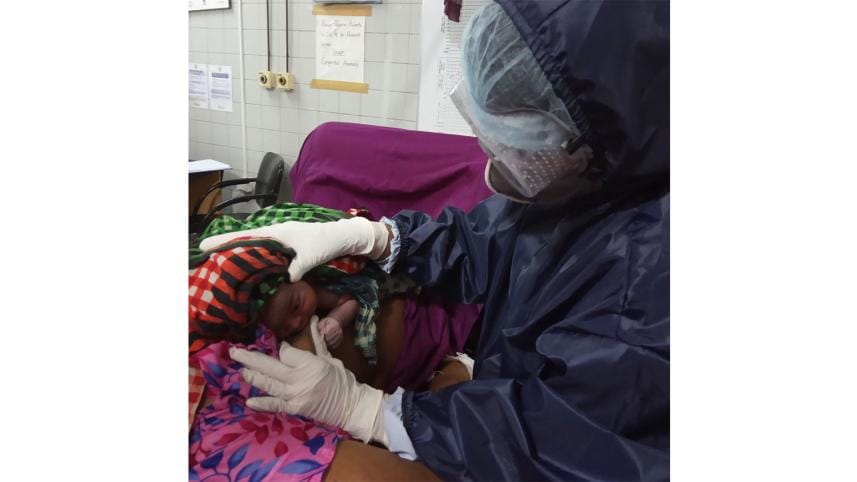Midwives in times of crisis

Every day, every moment, a mother gives birth and a new life begins. However, around the world, poor quality and limited access to sexual and reproductive health services and information lead to tragic and preventable deaths and illness among women of childbearing age.
As we observe the International Day of the Midwife, we salute all the midwives around the world who are putting their lives at risk to provide pregnant and new mothers with the care that they need. Clad in gloves, masks, goggles, and gowns, these midwives are our heroes. They are braving Covid-19 to ensure that no mother dies while giving birth.
Bangladesh can be proud of the remarkable progress made on the maternal health front.
I have been fortunate to meet so many midwives around Bangladesh, continuously inspired by their service. Just before the travel restrictions, I visited a health facility in rural Moheshkhali, where midwives described their experience saying: "Living in this remote area, away from our family and home, is definitely not easy. We face many hardships and sacrifice a lot, but it brings us great joy to serve the women. We want to serve all mothers in Bangladesh. Everyone deserves the right to quality healthcare." This is the resilience, sheer determination, and wholehearted serving of the midwives in Bangladesh, and these are the heroes that we salute today and every day.
Despite their commitment and the progressive improvements in the healthcare system, maternal mortality, however, has remained stagnant in Bangladesh, at close to 200 per 100,000 live births over the last 10 years. At present, about half of the births still take place in homes, at substantive risk for mother and child.
When a crisis strikes, skilled birth attendance and emergency obstetric care become even more important, especially in a country such as Bangladesh where it is estimated that around 400 births take place every hour.
Every woman must have access to respectful maternity care including emergency obstetric care. Hospitals, in particular, must be equipped with skilled professionals to be able to treat emergency cases and prevent them through early detection. As the UN's sexual and reproductive health agency, UNFPA believes in safe birth, everywhere, all the time, under all circumstances. This includes during health emergencies and humanitarian situations such as the Covid-19 pandemic.
Midwives are key caregivers for mothers and their new-borns
Midwives play a crucial role in the health and wellbeing of a mother and their new-born. They are key caregivers, during pregnancy, labour, childbirth, and in the post-delivery period, and are skilled birth attendants that are educated to identify and provide initial treatment of complications, serving mothers heart-to-heart.
In addition to enabling safe childbirth, professional midwives also play a critical role in providing comprehensive sexual and reproductive health information and services to women and couples within their communities, such as family planning services, information and counselling, including on gender-based violence. They can also perform breast and cervical cancer screening. Such services are crucial to ensure healthy women, healthy families, and healthy communities, and thus must continue to be provided amidst humanitarian and health emergency situations.
Midwives must be skilled professionally to deliver life-saving services
In 2010, Prime Minister Sheikh Hasina called for the introduction of a new cadre of professional midwives in line with the UN Secretary-General's "Every Woman, Every Child" initiative. UNFPA is proud to have supported the government of Bangladesh in establishing the country's first ever Professional Midwifery Programme.
The flagship initiative has introduced a system of standardised pre-service education and deployment of midwives, focusing on sexual and reproductive health services. Currently, 1,149 registered midwives have been deployed to 342 Upazila Health Complexes around the country. A total of 4,623 midwives have graduated and 4,399 are licensed.
Since the deployment of licensed midwives in August 2018, the access and quality of women's healthcare has improved across Bangladesh, with the safe delivery of over 100,000 babies and provision of family planning services to 100,000 women, including in humanitarian emergency situations. Additionally, 155 Upazila (sub-district) Health Complexes have reported an increase in delivery rate by over 10 births per month. These are the midwives who today are braving Covid-19 to ensure that every mother and new-born, across the country, receive the care and attention that they need.
This increase in professional midwives has only been possible through the joint efforts of the government, UNFPA, UNICEF, WHO, and the civil society, and support from our many development partners, particularly the governments of Canada, Sweden, and the United Kingdom.
Midwives deserve enabling environments to deliver quality care
However, gaps within the system still exist, and there is room for improvement, including clear career development, conducive environments, opportunity for higher education, and clear accountability. Midwives must be recognised as separate from nurses, and as accountable and autonomous professionals, providing sexual and reproductive health services and information.
Given the current Covid-19 context, it is of utmost importance that midwives have access to Protective Personal Equipment (PPE) and receive training on how to effectively and efficiently use PPE for their own safety and that of their patients. It is vital that they are able to operate in a safe and enabling environment, in line with Bangladesh's health policies, that set a clear agenda for midwives to take the lead in providing maternal and new-born health care.
It is vital that women continue to feel safe and get the proper support in hospitals, and that safe deliveries are maintained even under these unprecedented and difficult circumstances.
Saluting midwives today and every day
Every day, midwives bring lifesaving health services to women, particularly to vulnerable women and girls. They play a critical role in the realisation of the 2030 Agenda for Sustainable Development, accelerating the ICPD Programme of Action in Bangladesh, as well as in delivering UNFPA's mandate of ensuring every childbirth is safe, every pregnancy is wanted, and every young person's potential is fulfilled.
This is why 2020 has been declared as the International Year of the Midwife. It is a global movement recognising the unwavering commitment and service that midwives dedicate towards women around the world. On behalf of UNFPA, I commend the government of Bangladesh, in particular the Ministry of Health and Family Welfare, for ensuring a strong midwifery programme in the country, which has strengthened the health system to be able to respond better during health emergencies such as Covid-19. It is through this programme that we have been able to ensure professional midwives are deployed across the country to provide life-saving services.
As we salute midwives today, and every day, we remain committed to supporting the government of Bangladesh in ensuring that more midwives are educated, licensed, and deployed across the country, to reduce its maternal mortality and safeguard the precious lives of all mothers and new-borns in the country.
Thank you midwives for your brave and selfless service, everywhere, and under all circumstances. You continue to inspire all of those around you.
Dr Asa Torkelsson is UNFPA Representative in Bangladesh.




 For all latest news, follow The Daily Star's Google News channel.
For all latest news, follow The Daily Star's Google News channel.
Comments